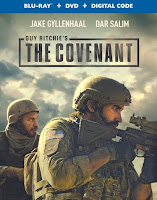Revoir Paris
(Music Box Films)
Alice Winocour’s latest psychological study of individuals under duress (following Augustine, Disorder and Mustang) alternates between being perceptive and merely cursory as it follows Mia, a Russian translator who survives a horrific mass shooting in a Parisian café and tries to deal with its disastrous emotional and physical aftermath. As Mia, Virginie Efira won the best actress Cesar for her devastating performance, which goes a long way toward making Winocour’s hit-or-miss drama seem more penetrating than it is.
(Bernal Beach Films)
In anticipation of this summer’s Barbie movie by the overrated Greta Gerwig that stars Margot Robbie (whose 2022 appearances were in the huge bombs Amsterdam and Babylon), Susan Stern’s 1998 documentary exploring the history and legacy of the famous doll returns. It clocks in at less than an hour, yet Stern brings up many facets—sexism, misogyny, empowerment—and includes interesting takes from Ruth Handler and her husband, Elliot, who founded Mattel, and others who have collected, enjoyed or hated the doll over the decades.
(Wise Lars LLC)
Similar to a sit-down chatfest like My Dinner with Andre, Russell Brown’s three-act film follows Rose, a former star hoping to plot her comeback, and Loren, an up-and-coming director hoping to help her out. In a series of conversations framed by a device out of Citizen Kane, the pair discusses the movie industry, her long career and other issues, none of which are given much depth but at least are colored by the presence of the still glamorous Jacqueline Bisset. Kelly Blatz comes off less well opposite Bisset in this engaging but slight 90 minutes.
(Red Splat)
The New York art scene of the 1980s is given a thorough run-through by director Brian Vincent in his documentary about artist Edward Brezinski, who ran in the same downtown circles as Basquiat and Keith Haring but who never achieved their public and critical renown, dying forgotten in Cannes, France, in 2007. Vincent dissects Brezinski’s life and career through an array of chatty subjects, including art historians, gallery owners, photographers and fellow painters, along with much valuable archival footage that puts Brezinski’s work and legacy into perspective.
(Cinema Guild)
Umberto Eco was a polymath, author, intellectual, and philosopher whose library—which contains thousands of volumes in several languages and on a myriad of subjects—may be his greatest and lasting posthumous legacy, according to director Davide Ferrario’s fascinating documentary. Through archival interviews with Eco and discussions with family members, associates and close friends, Ferrario presents a complex portrait of a multifaceted individual whose rigorous intelligence, pointed humor and best-selling novels mark him as a giant of the 20th century.
Evil Dead Rise
(Warner Bros)
This exceptionally icky reboot of another horror franchise is base and unimaginative: a malevolent spirit causes people to mercilessly butcher others and then reincarnates to continue the butchering. If that sounds appealing—I know some will sign up for it immediately—then go for it; too bad that writer-director Lee Cronin only finds a few different ways to keep blood spurting and gore flowing (and does it flow, opening with a young woman being scalped and ending with a wood chipper vaporizing a multi-headed monster) and the 90 minutes seems mercilessly padded. On UHD, the color is vividly present; no extras, which seems a recent trend for new releases.
(Warner Bros)
This genial 1983 comedy is a very bumpy ride, with mainly cheap and obvious laughs and crude sexism: we see Beverly d’Angelo nude in the shower for no reason and Christie Brinkley’s available/unavailable supermodel entices Chevy Chase to skinny dip in a hotel pool. Harold Ramis’ slapdash directing and John Hughes’ sloppy script don’t help, while Chase sleepwalks through the laconic persona that serves him much better in Fletch. At least it has Lindsey Buckingham’s hummable “Holiday Road” and small but fun parts for John Candy, Brian Doyle-Murray and Imogene Coca. The film looks sharp in 4K; lone extra is an audio commentary.
Horowitz in Moscow
(C Major)
When superstar pianist Vladimir Horowitz, at age 82, returned to his native Russia for the first time in six decades in 1986, cameras followed him while meeting with people he hadn’t seen in years and performing an emotional recital in Moscow. This absorbing documentary intercuts moments of intimacy between the pianist and others with his penetrating performances of pieces by Chopin, Rachmaninoff, Scriabin, Schubert and Schumann. The film looks fine if a little ragged on Blu, with decent audio.
(Opus Arte)
This new ballet, scored by Joby Talbot and choreographed by Christopher Wheeldon (and based on the beloved novel by Laura Esquivel, which spawned the hit 1992 movie adaptation) was filmed at last year’s world premiere staging in London’s Royal Opera House. The Royal Ballet’s principal dancers—especially the incandescent Francesca Hayward as the heroine Tita—are unimpeachable, as is Wheeldon’s expressive choreography. Talbot’s conventional music is led by the terrific conductor Alondra de la Perra, who teams with the orchestra to give it more warmth. The hi-def video and audio are first-rate; extras are interviews with the principals.
Matter Out of Place
(Icarus Films)
In his latest provocative visual essay, Austrian director Nikolaus Geyrhalter chronicles how our planet has pretty much become a gigantic garbage dump, and travels to various places—Switzerland, Albania, Nepal, Maldives, Austria, Greece and Nevada’s “Burning Man”—to record how our massive amounts of trash have reached all corners of the earth, even far-flung areas, and the sheer struggle it is to try and get it under control. Exceptionally beautiful, as all of Geyrhalter’s films are, it’s also extremely unsettling to watch as our only home is overtaken by refuse—even under the sea.





















.png)


























